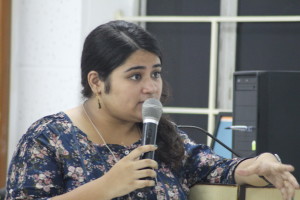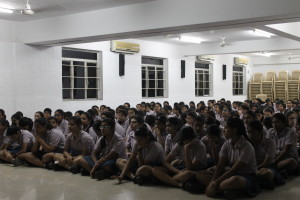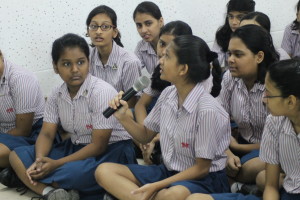The last phase of the Exchange for Change project dealt extensively with oral history narratives. School children on either side of the border collected oral histories from people who had either witnessed the partition themselves, or had heard about partition from those who had experienced it.
Rudrani Gangopadhyay, a volunteer with the 1947 Partition Archives, was with us at Modern High School for Girls, to talk to the participants of Exchange for Change about her experiences collecting oral histories.
We started off by playing two video recordings of interviews conducted by Rudrani—one of an elderly lady who had actually witnessed Partition and the other of a gentleman who had not witnessed partition himself but had heard accounts of it from other. The two interviews were very different. The lady spoke of the violence and the bloodshed, while the gentleman spoke of how happy people were, that there were smile all around. The difference was marked, and the students commented on this. The students spoke about how they felt while listening to the accounts.
‘I felt that there were a lot of similarities between what the people in India and the people in Pakistan experienced’.
Some of the students spoke about their experiences collecting oral history interviews and what they had heard from the people they interviewed.
Rudrani showed two clips from interviews that had been collected as part of her project -one of someone who migrated from India to Pakistan and vice versa. She then discussed the importance of collecting oral histories—the fact that many of the people who have actually experienced events like these are no more and with them, important accounts of history will also die out.
‘I think these experiences are what we will not find in history textbooks. It is very important to preserve these, because otherwise they will get lost.’
‘It is important to share the interviews. People in India have a bad feeling about those in Pakistan and vice versa. Sharing the interviews will allow people to know that it wasn’t just one side that suffered.’
During the discussion, what came up repeatedly was the fact the history textbooks very often do not address incidents in their entirety. Or as Rudrani said, ‘they give processed accounts’. Oral histories bring what is neglected into the light, often showing there are two sides to every account.
– Paroma Sengupta



